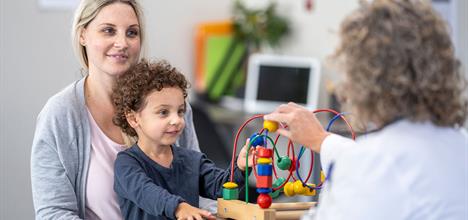Behavioral pediatrics is a specialized field within pediatrics that focuses on the emotional, developmental, and behavioral well-being of children and adolescents. As mental health awareness grows and developmental disorders become more widely recognized, the role of behavioral pediatrics has become increasingly essential in identifying, diagnosing, and managing a range of psychological and behavioral conditions in young patients.
What Is Behavioral Pediatrics?
Behavioral pediatrics, also referred to as developmental-behavioral pediatrics (DBP), is a subspecialty of pediatrics that addresses issues related to child development, behavior, learning, and mental health. Unlike general pediatrics, which primarily treats physical illnesses and injuries, behavioral pediatrics evaluates how emotional and psychological factors affect a child’s overall health.
Practitioners in this field are trained to identify and treat a wide array of conditions that affect a child’s ability to function well at home, school, and in social settings.
Common Conditions Treated in Behavioral Pediatrics
Behavioral pediatricians work with children facing a range of challenges, including:
-
Attention-Deficit/Hyperactivity Disorder (ADHD)
-
Autism Spectrum Disorder (ASD)
-
Learning disabilities (e.g., dyslexia, dysgraphia)
-
Oppositional Defiant Disorder (ODD)
-
Anxiety and depression
-
Sleep disorders
-
Tics and Tourette syndrome
-
Behavior problems associated with chronic illness or trauma
These professionals often collaborate with psychologists, psychiatrists, educators, speech-language therapists, and occupational therapists to create an integrated treatment plan tailored to each child’s unique needs.
Assessment and Diagnosis
A thorough evaluation by a behavioral pediatrician may include:
-
Detailed developmental history
-
Behavioral observation
-
Standardized testing
-
Input from parents, teachers, and caregivers
This comprehensive assessment helps determine whether the child’s behaviors fall within the expected developmental range or indicate a deeper issue that requires intervention.
Treatment Approaches
Behavioral pediatrics focuses on non-invasive, often multi-disciplinary treatments. These may include:
-
Parent training and counseling – Equipping parents with strategies to manage behaviors at home.
-
Behavioral therapy – Techniques such as cognitive-behavioral therapy (CBT) to help children regulate emotions and behavior.
-
Educational support – Coordinating with schools to develop Individualized Education Programs (IEPs) or 504 Plans.
-
Medication management – When necessary, medications may be prescribed in conjunction with therapy to treat conditions like ADHD or anxiety.
-
Social skills training – Helping children improve peer interaction and communication.
Importance of Early Intervention
Early identification and intervention are critical in behavioral pediatrics. Studies show that children who receive support for developmental or behavioral concerns at a young age are more likely to succeed academically, socially, and emotionally later in life. Delays in diagnosis or treatment can lead to poor academic performance, low self-esteem, and long-term mental health issues.
Behavioral Pediatrics vs. Child Psychiatry
While both fields deal with mental and behavioral health, there are key differences:
-
Behavioral pediatricians are medical doctors with pediatric training who specialize in developmental and behavioral issues. They are often the first point of contact for parents and tend to focus on non-pharmacological interventions initially.
-
Child psychiatrists are specialists in mental health who may diagnose and treat more complex psychiatric disorders, often using a combination of therapy and medication.
Both specialties may collaborate when a child has overlapping developmental and psychiatric needs.
When to See a Behavioral Pediatrician
Parents or caregivers should consider consulting a behavioral pediatrician if:
-
A child has persistent behavior issues affecting school or home life.
-
Developmental milestones are significantly delayed.
-
Teachers express concerns about attention, learning, or social interaction.
-
A child shows signs of anxiety, depression, or emotional distress.
-
Behavioral concerns persist despite efforts at home and school.
The Role of Parents and Caregivers
Behavioral pediatric care is most effective when parents are actively involved. Caregivers are often trained to implement behavioral strategies, establish routines, and create a supportive environment that nurtures the child’s growth. Open communication with the care team and consistency at home play a critical role in treatment success.
The Future of Behavioral Pediatrics
The field is rapidly evolving with greater research into childhood mental health, neurodevelopmental disorders, and integrated care models. With rising awareness and reduced stigma, more families are seeking help earlier. Additionally, advancements in telehealth and digital tools have expanded access to behavioral care, especially in underserved areas.
Conclusion
Behavioral pediatrics bridges the gap between physical and mental health in children, offering a holistic approach to developmental and behavioral challenges. By focusing on early diagnosis, family-centered care, and collaboration with educational and mental health systems, behavioral pediatricians play a vital role in ensuring that every child has the opportunity to thrive.






